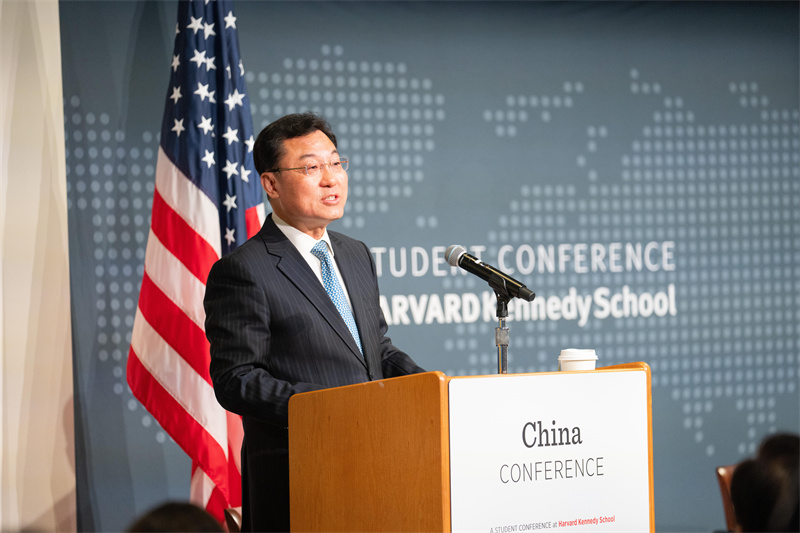Chinese envoy calls for comprehensive reforms
Nation pledges to advance opening-up, modernize industries to boost growth


Chinese Ambassador to the United States Xie Feng said on Monday the "low-hanging fruits" of reform have been reaped, and all that is left are "hard bones to chew". To live up to the expectations of the people and the world, China's reforms have to be "more targeted, systemic and comprehensive".
The overriding theme of the third plenary session of the 20th Central Committee of the Communist Party of China is "further deepening reform comprehensively to advance Chinese modernization", Xie said in an interview published in US media outlet Newsweek.
China is at "a pivotal stage for transforming its growth model and optimizing its economic structure", he said.
"It is only natural that there will be some growing pains. All these issues have arisen in the course of development and transformation."
The communique issued after the Third Plenary Session says China "will deepen comprehensive reform in education, deepen structural scientific and technological reform and deepen institutional reforms for talent development".
In the resolution adopted at the plenum, "reform" as a keyword appeared 145 times, and "opening-up" 35 times, Xie said.
The Chinese economy is facing difficulties in consumption, real estate and local government debt. To address these issues, China will "advance high-standard opening-up", he said. "We will continue to invigorate growth through reform, unleash productivity and create stronger impetus for Chinese modernization."
China plans to boost economic growth by modernizing industries, developing new sectors such as artificial intelligence and biomedicine, and enhancing urbanization to drive consumer spending and investment, he said. The government will promote urban-rural integration and increase public services for rural migrants.
China is adopting "a new development model for the real estate sector", Xie said. The focus is on meeting the demand for both essential and improved housing by increasing government-subsidized housing. Additionally, municipal governments will be granted more decision-making powers to regulate the property market effectively, he said.
Mitigating risks
To mitigate local government debt risks, China will increase local tax revenue sources to provide more fiscal resources to the local governments. This involves reforming excise tax collection, granting greater tax management authority to local governments and expanding the use of funds from special-purpose bonds. A monitoring and oversight system will also be established to enhance debt management, Xie said.
Xie said he is confident that China will meet its economic growth goal of about 5 percent this year and "also build momentum for sustainable development in the long run".
The International Monetary Fund released the final report for China's 2024 Article IV consultation on Friday, saying China's economy "has remained resilient" even though the property sector is experiencing continuing difficulties.
The IMF increased its growth forecast for the Chinese economy through 2024 to 5 percent, an upward revision of 0.4 percentage points compared with the projections released in the IMF's World Economic Outlook in April.
This expectation aligns with China's goal, announced earlier this year, of reaching 5 percent economic growth this year.
China is committed to "market-oriented reform", Xie said. The country aims to balance the roles of the market and government by allowing the market to efficiently allocate resources while enhancing government's macroeconomic governance, he said.
"Opening-up is the hallmark of Chinese modernization," he said. China's modernization focuses on opening up its economy by reducing restrictions and enhancing foreign investment.
Key measures include shortening the negative list for foreign investments, removing market access restrictions in manufacturing and ensuring equal treatment for domestic and foreign enterprises, he said.
According to a recent report by the China Council for the Promotion of International Trade, more than 40 percent of the surveyed foreign-invested companies see China's market as more attractive, and nearly 50 percent expect their profit margins to increase in the next five years, with US companies being the most optimistic, Xie said.
Chinese media has given positive reviews on the recently concluded Third Plenary Session, while Western media has been more critical. Xie said the difference in perspectives highlights the importance of firsthand experience.
"Seeing is believing. The best way to understand a country is to be there," he said, highlighting China's visa-free entry to a growing number of countries and regions. Citizens from 54 countries, including the US, can now benefit from the 72/144-hour visa-free transit policy.
"To all American friends, you are most welcome to embark on an on-a-whim trip to China," he said.

































